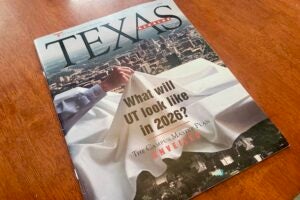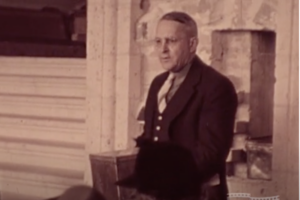AUSTIN, Texas — In this digital age, we often take for granted that our cultural heritage is available online, yet much of our audiovisual heritage including films and recordings of poetry readings, dance performances, presidential speeches and oral histories remains largely inaccessible. As a result, important AV materials representing bygone traditions and cultures are underused, understudied and in danger of being lost to history.
A team led by Tanya Clement, associate professor of English at The University of Texas at Austin, plans to create greater access to audiovisual collections thanks to a $450,000 grant from The Andrew W. Mellon Foundation that will support the team’s AudiAnnotate Audiovisual Extensible Workflow (AWE) project. The goal of the AWE project is to accelerate access to, promote scholarship and teaching with, and extend understanding of significant digital audiovisual collections in the humanities.
“Basically, we’re making it easier to annotate AV materials and share those annotations online. Annotating has been the basis for creating access to cultural objects since monks included commentary on medieval manuscripts,” Clement said. “For example, in this 1939 Library of Congress recording I’ve annotated where Zora Neale Hurston is speaking. Without my notes, you wouldn’t know where on this hour-long recording to find her voice. The ability to annotate lets us add personal and historical context so people understand what AV contains and why it is important.”
She said the grant from The Mellon Foundation, facilitated through its Public Knowledge program, will help the AWE team — which also includes Brumfield Labs in Austin and information management consulting and software company AVP — develop a workflow of free, user-friendly open-source tools for creating and sharing audiovisual projects.
“People forget that you can’t just Google audio with your voice or Google video by waving your hands; AV objects have to be labeled (annotated) by humans with metadata before we can search them on the web,” said Clement. “With this workflow, we hope to broaden the use of audiovisual materials in research, teaching and the public by scaling up the use of international standards and free audiovisual annotation frameworks and making AV, ultimately, easier to find and use.”
In addition to UT Austin’s Harry Ransom Center, AWE will partner with the International Image Interoperability Framework Consortium (IIIF), the Furious Flower Poetry Center (James Madison University), the American Folklife Center and Labs at the Library of Congress, the Fortunoff Video Archive for Holocaust Testimonies at Yale University, the Louie B. Nunn Center for Oral History at the University of Kentucky, the Woodberry Poetry Room at Harvard University, and the SpokenWeb Consortium, which is building a nationally networked digital archive of literary and creative audio recordings.
“This grant further enhances our college’s work in the digital humanities, which not only benefits teaching, research and collaboration, but also provides opportunities for our students to learn how to use the latest technological tools and explore new ways to learn about our shared humanity,” said Ann Stevens, dean of the College of Liberal Arts. “Dr. Clement has been a leader in creating partnerships that benefit our communities’ cultural heritage institutions such as libraries, museums and schools while also supporting the work of scholars and anyone who works with these materials.”
Clement says the grant will allow the AudiAnnotate project to engage the work of UT’s interdisciplinary Good Systems project, which promotes the development of ethical artificial intelligence and machine learning tools, and it will build on her previous work with the High Performance Sound Technologies for Access and Scholarship, AVP’s Aviary software, and the AudiAnnotate tool.




